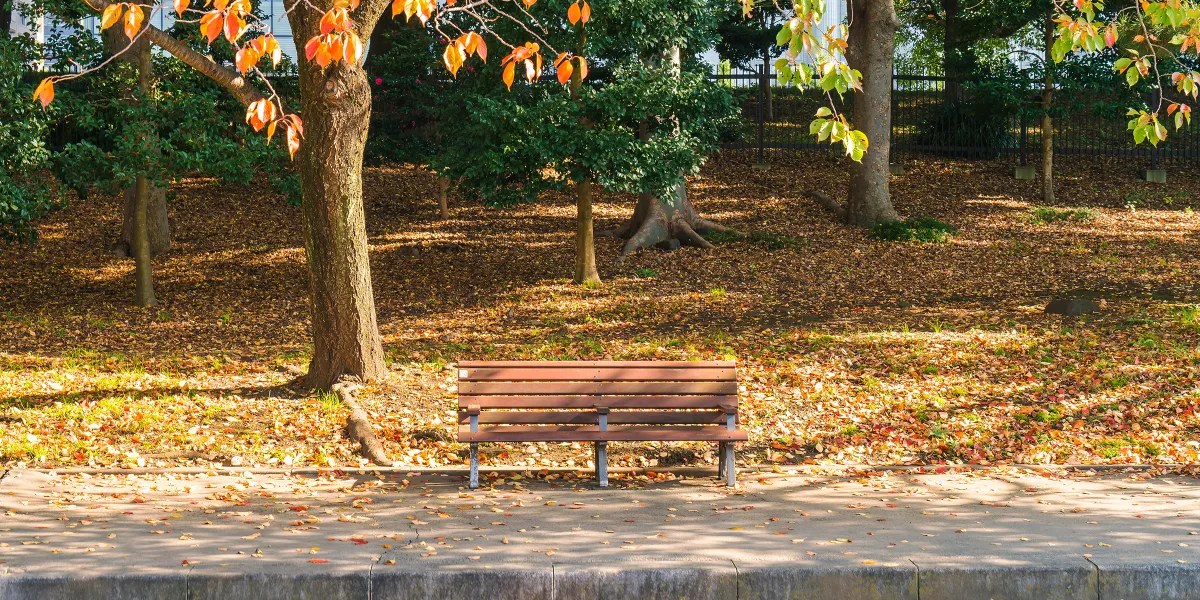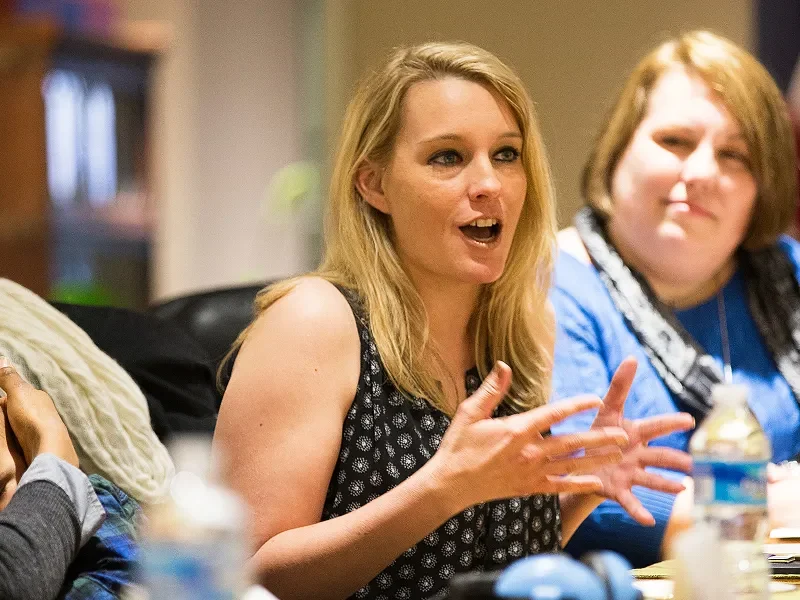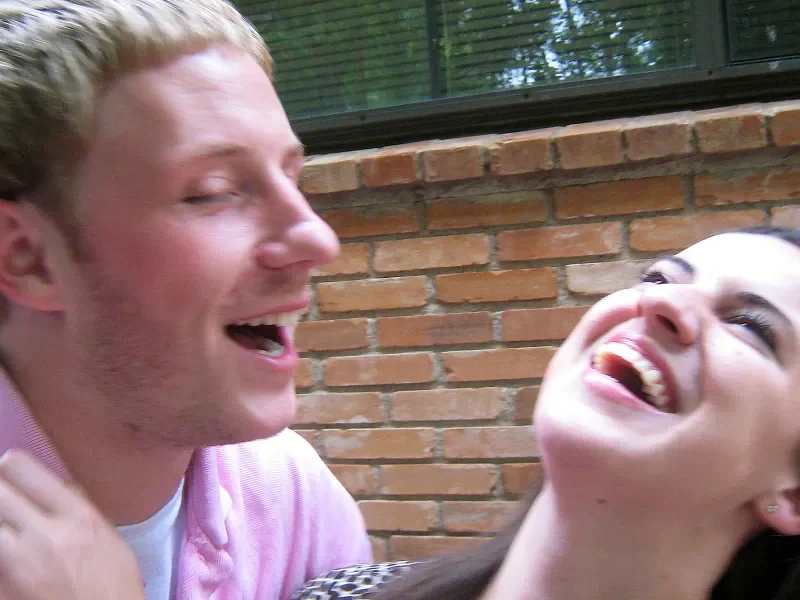Some days blur into each other when you’re just trying to survive. But every now and then, something happens that slices through the noise and stays with you forever. For me, it started with a walk in the park and a blind man’s sign.
My name is Jenny, I’m 36, and I’ve been a single mom for the last three years.
That sentence has never come easy. Even now, it still knocks the wind out of me when I say it aloud. It feels like I’m admitting something that should’ve never been real. But it is. My husband, Matt, died in a car crash three years ago this November. One rainy evening, one call, and everything I knew about life shattered like glass.
Since then, it has just been me and the kids, Adam and Alice. Adam is eight and sharp as a tack, always asking questions I can’t quite answer. Alice is six, soft-hearted and wild, always holding onto my hand like she knows I need the comfort more than she does.
We live in a small rented two-bedroom on the second floor of an old duplex with thin walls and creaky floors. Our neighbor downstairs smokes too much, and the radiator knocks at night. But it’s warm in winter, and the roof doesn’t leak. That’s more than a lot of people can say.
After Matt passed away, I had to figure out how to keep a roof over our heads and food on the table with only one paycheck. I work part-time at the local library and take on freelance transcription work late at night after the kids are asleep. It’s not glamorous, but it keeps us going. Rent, groceries, school supplies, and shoes all require careful planning.
There are days I hold my breath, swiping my card at the grocery store.
Still, I try. I really try to keep things soft for the kids. I make sure their birthdays still have balloons. I buy marshmallows for their hot chocolate. On Sundays, we go to the park even if I’m exhausted. I want them to be kids, not little adults worrying about money or grief. That’s my job.
That Sunday afternoon, the sun was out after a string of gray days. It was the kind of afternoon that made everything feel lighter. We took the long way through Riverside Park because Adam wanted to find chestnuts again. It’s become a sort of treasure hunt for him. He takes it very seriously.
Adam had already run ahead, his red hoodie flashing between the trees, yelling over his shoulder, “I found one, Mom! No, wait—two!”
Alice skipped behind him, her braids bouncing, and called, “That one’s mine, Adam! You said I will get the next shiny one!”
They were loud, happy, and free. And I was grateful they could still laugh like that.
I followed slowly behind, my tote bag slung over my shoulder like always. Inside was everything: my worn wallet, a half-eaten granola bar, a squashed juice box, and a pouch of markers. Always the markers. Thick ones, thin ones, every color you could imagine. We never went anywhere without them. Drawing was how I kept the kids calm whenever we had to wait, whether it was at the clinic, the DMV, or even at church.
We stopped at a bench near the bend in the path. Adam was already building a tower with his chestnuts, counting under his breath. Alice crouched beside him, trying to stack hers taller.
“Mommy, look!” she shouted proudly. “Mine’s winning!”
“You’re both architects in the making,” I said, smiling at their crooked creations.
That’s when I noticed him.
Just off the path, near the bushes, an old man sat cross-legged on a thin, frayed rug. His head was bowed. His shoulders looked heavy, like they’d been carrying something for a long time. Beside him was a piece of cardboard with black, uneven letters: I AM BLIND. PLEASE HELP.
Something in me twisted. He wasn’t shouting or reaching out. He just sat there, silent and still, while the world passed him by.
I glanced into my wallet. There wasn’t much. Two crumpled dollar bills. A few coins. But I couldn’t just walk past. His cup was nearly empty, the coins inside barely enough to make a sound.
I stepped over and bent down, dropping the bills into his empty cup.
He moved slightly, his hand shaking as it reached out and brushed against the edge. When his fingers closed around the bills, his head lifted a little.
“Thank you,” he said, his voice dry and quiet. “You have no idea what this means to me.”
I swallowed hard. “You’re welcome,” I murmured.
He nodded slowly. “Most people don’t even stop. I sit here all day sometimes.”
I didn’t know what to say to that. My eyes stung a little. I gave him a small nod and walked back to the bench.
Adam looked up from his tower. “Who was that man, Mom?”
“Just someone who needed a little help,” I said gently.
Alice tugged on my sleeve. “Is he okay?”
“I don’t know, sweetie.”
They went back to their game, their voices loud again, but my mind was elsewhere. I kept glancing back at him. Time passed. Ten minutes. Maybe twenty.
Each time someone passed him without looking, it felt like a quiet kind of cruelty.
I watched as person after person walked by. Joggers, families, couples. Some glanced at him, but no one stopped. Not one coin. Not one word.
My stomach twisted. That cardboard sign wasn’t just asking for help. It had become invisible. People didn’t even see him.
Something about his stillness felt unbearable, like the world had pressed mute on his existence.
I stood up without thinking. My feet moved before my brain caught up. I walked back to him.
He tilted his head, sensing me. His fingers gently touched the tip of my shoe.
“What are you doing?” he asked, confused.
“Helping,” I said quietly, kneeling.
I took the cardboard sign and turned it over. Then I pulled out the black marker from my pouch and uncapped it with a snap.
He stayed still. Just listening.
I thought carefully, then began to write in big, clear letters. Words that might actually reach someone.
When I finished, I set the sign facing the path again. I didn’t say anything. I just sat nearby, pretending to watch the kids.
But it worked. Within minutes, a man with a backpack stopped and dropped coins into the cup. Then a woman pressed a folded bill into his hand. A mother walked past with her toddler and stopped to add something green.
The old man’s face began to shift. His mouth curled upward into a smile so wide it made my chest ache.
“Thank you,” he said again, but this time louder, his voice shaking. “Thank you! I’ll get to eat tonight. I’ll sleep warm. God bless you!”
I stood there, barely holding back tears.
He didn’t even know what I wrote.
I turned to call the kids. “Adam, Alice—time to head back!”
They grabbed their towers and ran toward me, out of breath and red-faced from laughing. I took each of their hands, gave one last look at the man, and started walking.
But just as we passed him, he turned his head.
“Ma’am!” he called. “Ma’am!”
I stopped.
“I recognized your voice,” he said softly. “You were the one who rewrote my sign, weren’t you?”
I nodded before realizing he couldn’t see it.
“Yes,” I said.
“What did you write?” he asked. There was wonder in his voice, like he was hoping the answer might mean something more than just words.
I opened my mouth to answer, but before I could say anything, a tall, broad-shouldered man stepped right into our path. His eyes were locked on me, face unreadable, jaw clenched tight.
That’s when I realized something was about to shift.
The man in the suit stood directly in front of me, blocking our path. His shoulders were broad, his posture stiff, and everything about him screamed “not normal.”
He looked like he’d stepped out of a boardroom and into the wrong reality. His white shirt was crisp, his black jacket perfectly tailored, not a single wrinkle in sight. He didn’t belong in this park. Not with the muddy path, the screaming children, or the falling leaves that clung to everyone else’s shoes.
He didn’t even blink.
“You and the children need to come with me,” he said, his tone flat and formal, like he was reading from a script.
I instinctively pulled Adam and Alice closer to me. Adam stood taller than usual, sensing something wasn’t right. Alice hid behind my coat, peeking out with wide, nervous eyes.
The blind man suddenly turned his head sharply, as though he could hear something no one else could.
“Leave her alone,” he snapped, voice steady and loud. “I’ll call the police!”
That startled me. I hadn’t expected him to speak up like that, not with such authority. I turned to him, and for a split second, I swore he knew something. It felt like he wasn’t just listening. He was watching, in his own way.
But the suited man didn’t even flinch. He didn’t acknowledge the old man’s voice at all. It was as if he hadn’t heard him or simply had no reason to care.
I steadied my voice the best I could. “Why should I go with you?”
He adjusted his cufflinks calmly, like I’d just asked him what time it was. “My client wishes to speak with you. That’s all. Nothing criminal. Just a conversation.”
His words were rehearsed, clean, and emotionless.
Something about his calmness made my skin crawl, like danger dressed in politeness.
I hesitated. Everything in me screamed to grab the kids and run, but something made me pause. Maybe it was curiosity. Maybe it was exhaustion. Or maybe it was the way the blind man didn’t stop watching, like he was silently telling me, “It’s okay. I’m still here.”
I gave a slight nod, still holding onto Adam and Alice. “Fine. But we’re not going far.”
He nodded once and turned without another word, leading us away from the path. We moved slowly down a narrow paved lane that cut behind the trees. The sun was beginning to dip, painting everything in soft gold.
He stopped near a gazebo overlooking the park. From where I stood, I could still see the blind man in the distance. His figure was small but present, like a quiet guardian watching from afar.
Inside the gazebo sat a woman who looked like she belonged in a different world entirely.
She was in her 60s, wore a fitted navy dress, and her silver hair was pulled back in a low bun. She wore pearls around her neck, the real kind, and her manicured hands rested gently on her lap. She looked calm, collected, and powerful.
“Jenny, is it?” she asked, smiling politely.
I nodded, still unsure whether I was walking into an opportunity or a trap.
“I’m Margaret,” she said, her voice smooth, almost melodic. “Please, have a seat.”
I didn’t move. “What’s this about?”
She studied me, then looked down briefly before meeting my eyes again. “I watched you earlier. I saw what you did.”
I blinked. “Excuse me?”
“You rewrote the blind man’s sign,” she continued. “His original message — ‘I AM BLIND. PLEASE HELP’ — was flat and forgettable. People saw it every day and kept walking. But you wrote, ‘It’s a beautiful day and I can’t see it,’ and suddenly the world cared. You didn’t just ask for help. You made them feel.”
I could hear Adam shifting beside me, his grip tightening on my hand.
“I didn’t do it for attention,” I said quietly. “I did it because no one else did.”
She nodded. “And that’s exactly why I’m here. What you did — changing just a few words — that’s not ordinary thinking. That’s instinct. It’s the core of great advertising. My company needs people who can see the world differently. Not just trained professionals with fancy degrees, but thinkers. Feelers. People like you.”
I stared at her. “Advertising?”
“Yes,” she said. “We’re not interested in resumes. We’re interested in results. In impact. And you, my dear, created a ripple effect today with a marker and a piece of cardboard.”
I didn’t know what to say.
Margaret continued, “We offer flexible hours. You can work remotely when needed. And the salary — we’re talking about more than enough to take care of your children. Comfortably.”
My thoughts raced. I glanced at Adam and Alice, who were now quietly seated at the edge of the bench inside the gazebo. Adam looked alert, like he was trying to figure out if this was a dream. Alice leaned into him, her head resting on his shoulder.
“You’d let me bring them when necessary?” I asked cautiously. “I can’t always find someone to watch them.”
“Of course,” she said gently. “We support families. We just want your mind. Your instinct.”
It felt too good to be real. But something about her, in the way she spoke and carried herself, told me this was real. And maybe it was even meant for me.
She handed me a small business card. “Let’s talk more tomorrow. Take the night to think about it.”
I nodded slowly, still stunned. “Okay. I will.”
When we left the gazebo, the sun had dropped a little lower, casting long shadows. The suited man stayed behind without a word, and I walked straight back to the blind man.
He was still sitting there, still calm. His face turned toward the sound of my footsteps. I crouched in front of him, opened my wallet, and pulled out the last ten-dollar bill I had in cash. I placed it gently in his hand.
“You don’t know this,” I said quietly, “but by helping you today, I helped myself. This is my thanks.”
His hand closed slowly over mine. “May God bless you,” he said, his voice softer now, but still warm. Then he tilted his head. “Tell me… what did you write on my sign?”
I smiled. “The same thing. Just different words.”
He gave a slow, knowing nod, as though he had already figured it out, like he’d been waiting to hear me say it out loud.
That night, I put the kids to bed like I always did. I tucked Alice in first. She held my hand a little longer than usual.
“Are we okay, Mommy?” she asked, sleep just starting to pull her under.
I kissed her forehead. “We’re more than okay, baby girl.”
Then I went to Adam’s room. He sat up straight, his eyes serious.
“That lady,” he said. “She wasn’t bad, right?”
I shook my head. “No, sweetheart. I think she might have been the opposite.”
The next morning, I stood outside the office where Margaret’s company was located, the contract she had sent clutched in my hands. My fingers trembled slightly as I signed my name at the bottom. Jenny Coleman, thirty-six years old. I was a widow, a mother, and now, an employee. For the first time in a long while, I felt something steady rise in my chest. It wasn’t fear or doubt. It was hope.
In the weeks that followed, things began to shift.
I had regular hours, a paycheck that didn’t disappear the second it arrived, and coworkers who respected what I brought to the table. I worked hard, but I had time for Adam’s soccer games and Alice’s school plays. For the first time in years, I didn’t feel like I was drowning.
The kids noticed too. One night at dinner, Adam leaned over his spaghetti and asked, “Does this mean we can get real maple syrup again?”
I laughed so hard I nearly cried. “Yes, sweetheart. I think we can.”
But I never forgot the park. I never forgot that quiet man sitting on the rug with the cardboard sign. Every now and then, the kids and I would go back. He wasn’t always there, but when he was, we always stopped. Not just to give, but to talk.
One afternoon, Adam asked him, “Were you scared of being out here alone?”
The old man smiled, his eyes cloudy but still gentle. “Sometimes,” he said. “But then people like your mom come around, and I remember there’s still kindness in the world.”
Alice held his hand and said, “My mommy’s the best writer ever.”
He chuckled and nodded. “That she is.”
Even now, whenever we pass someone who looks like they are struggling, whether it’s a man sleeping on a bench or a woman holding a sign at the intersection, Adam and Alice always tug on my sleeve and ask, “Can we help?”
They remember that moment the way other kids remember birthdays or holidays.
And I always say yes. Even if it’s just a smile. Even if it’s just a few words.
Because sometimes, that’s all it takes.
A quiet man, a blank sign, and a single sentence changed the course of our lives.
And maybe, just maybe, he knew more than he let on.


